Ethical and Legal Reflection: Patient Suicide Case Study Analysis
VerifiedAdded on 2023/06/14
|6
|1389
|131
Case Study
AI Summary
This case study reflects on the ethical and legal considerations surrounding the suicide of Mr. R, a patient with depression who jumped from a hotel after being discharged from a psychiatric ward. The analysis focuses on potential negligence in Mr. R's care, including poor communication with his family, inadequate mental health management, and the neglect of ethical principles such as justice, beneficence, non-maleficence, and autonomy. The reflection highlights the responsibilities of healthcare professionals like Rita, a registered nurse, in ensuring patient well-being and appropriate discharge decisions. It also discusses relevant ethical theories like deontology and utilitarianism, suggesting potential legal actions against the healthcare setting for inappropriate monitoring and treatment. The study concludes by emphasizing the importance of proper patient monitoring, risk assessment, and adherence to ethical guidelines to prevent similar incidents, offering a critical perspective on healthcare practices within psychiatric wards.
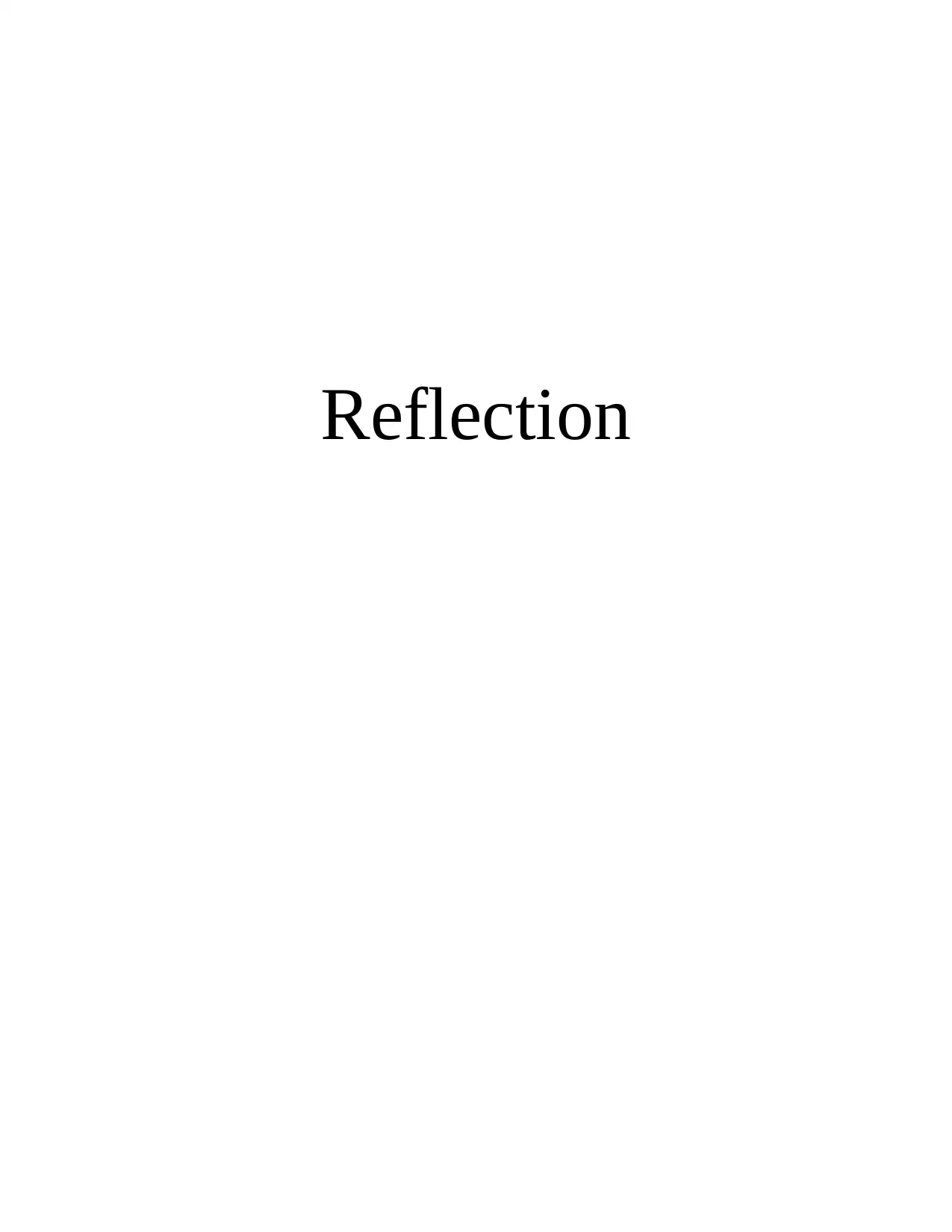
Reflection
Paraphrase This Document
Need a fresh take? Get an instant paraphrase of this document with our AI Paraphraser
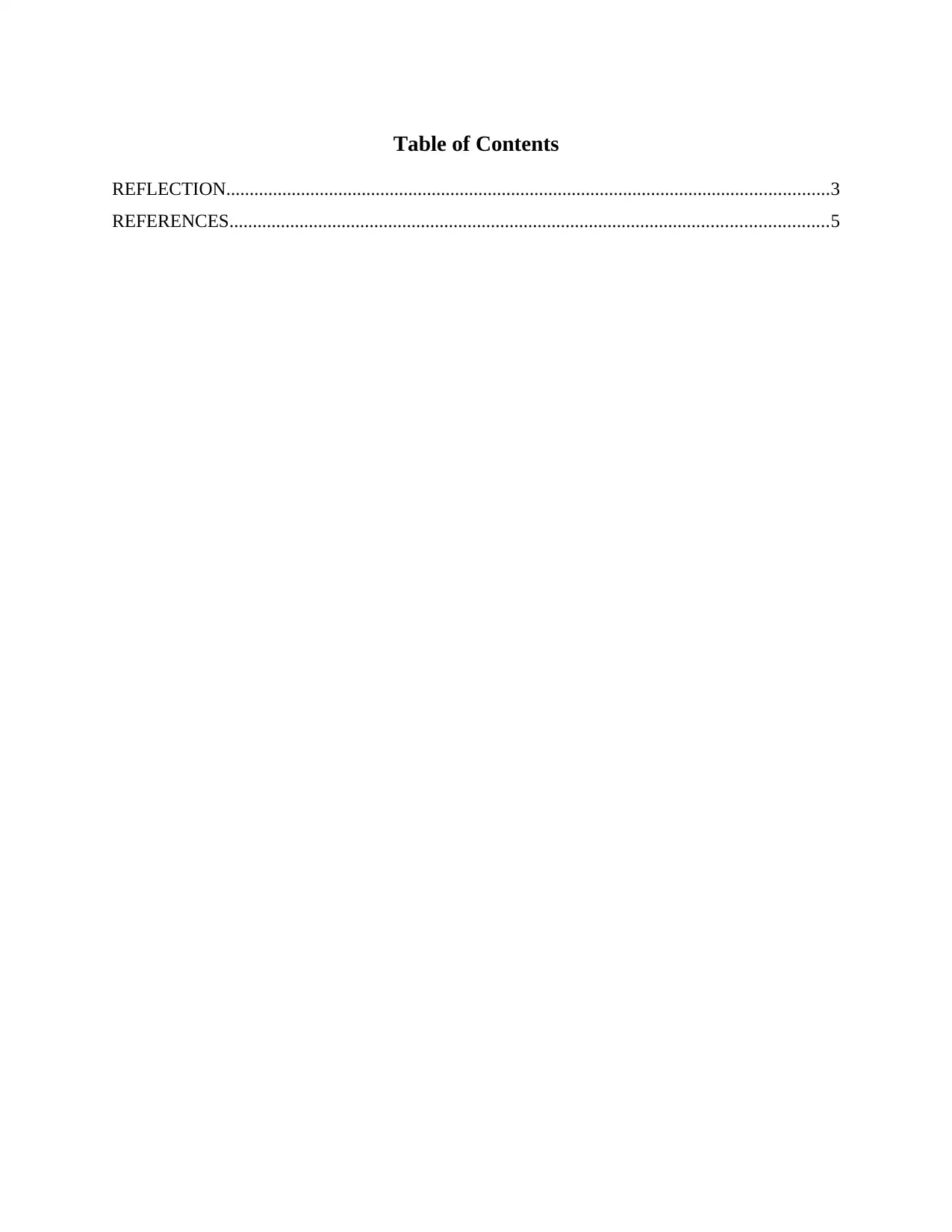
Table of Contents
REFLECTION.................................................................................................................................3
REFERENCES................................................................................................................................5
REFLECTION.................................................................................................................................3
REFERENCES................................................................................................................................5
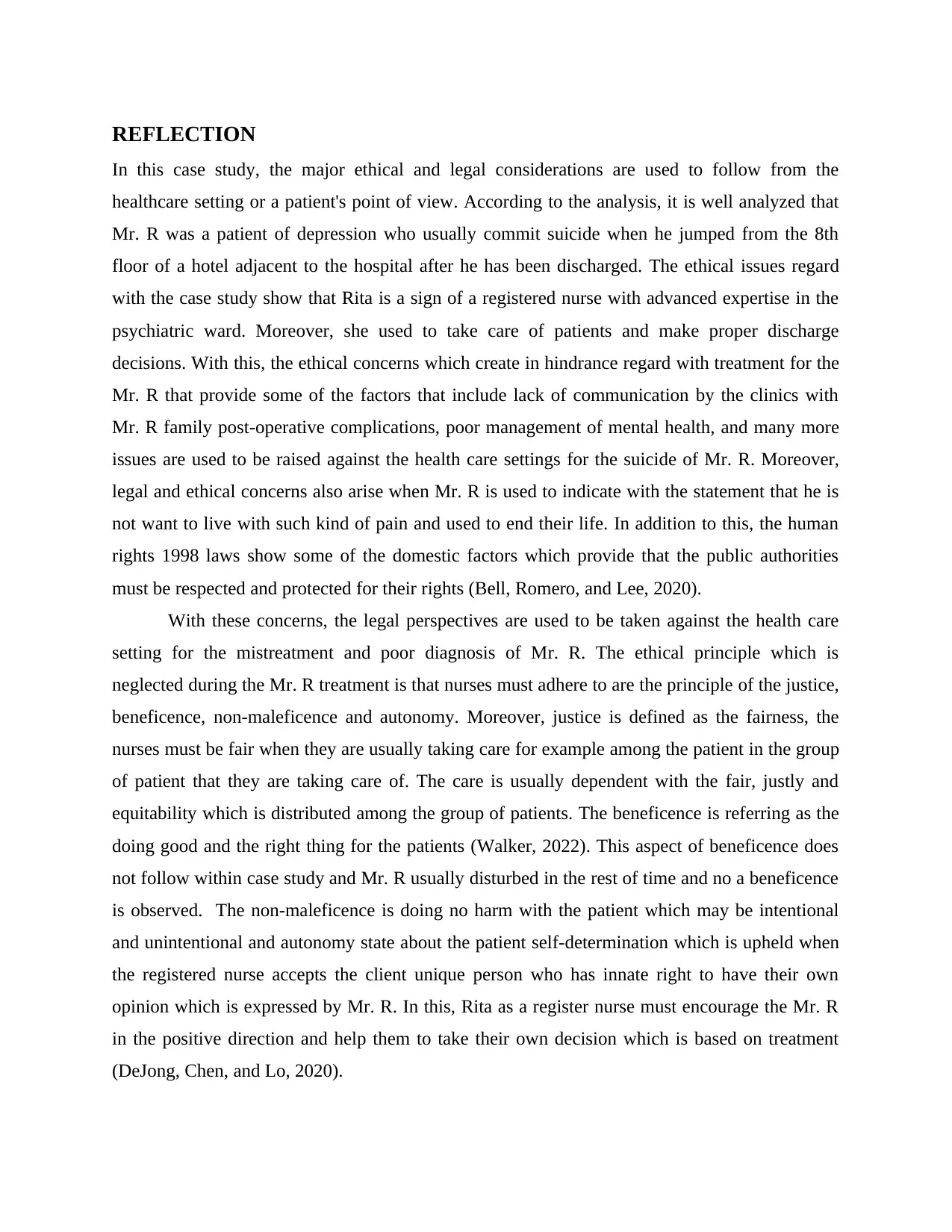
REFLECTION
In this case study, the major ethical and legal considerations are used to follow from the
healthcare setting or a patient's point of view. According to the analysis, it is well analyzed that
Mr. R was a patient of depression who usually commit suicide when he jumped from the 8th
floor of a hotel adjacent to the hospital after he has been discharged. The ethical issues regard
with the case study show that Rita is a sign of a registered nurse with advanced expertise in the
psychiatric ward. Moreover, she used to take care of patients and make proper discharge
decisions. With this, the ethical concerns which create in hindrance regard with treatment for the
Mr. R that provide some of the factors that include lack of communication by the clinics with
Mr. R family post-operative complications, poor management of mental health, and many more
issues are used to be raised against the health care settings for the suicide of Mr. R. Moreover,
legal and ethical concerns also arise when Mr. R is used to indicate with the statement that he is
not want to live with such kind of pain and used to end their life. In addition to this, the human
rights 1998 laws show some of the domestic factors which provide that the public authorities
must be respected and protected for their rights (Bell, Romero, and Lee, 2020).
With these concerns, the legal perspectives are used to be taken against the health care
setting for the mistreatment and poor diagnosis of Mr. R. The ethical principle which is
neglected during the Mr. R treatment is that nurses must adhere to are the principle of the justice,
beneficence, non-maleficence and autonomy. Moreover, justice is defined as the fairness, the
nurses must be fair when they are usually taking care for example among the patient in the group
of patient that they are taking care of. The care is usually dependent with the fair, justly and
equitability which is distributed among the group of patients. The beneficence is referring as the
doing good and the right thing for the patients (Walker, 2022). This aspect of beneficence does
not follow within case study and Mr. R usually disturbed in the rest of time and no a beneficence
is observed. The non-maleficence is doing no harm with the patient which may be intentional
and unintentional and autonomy state about the patient self-determination which is upheld when
the registered nurse accepts the client unique person who has innate right to have their own
opinion which is expressed by Mr. R. In this, Rita as a register nurse must encourage the Mr. R
in the positive direction and help them to take their own decision which is based on treatment
(DeJong, Chen, and Lo, 2020).
In this case study, the major ethical and legal considerations are used to follow from the
healthcare setting or a patient's point of view. According to the analysis, it is well analyzed that
Mr. R was a patient of depression who usually commit suicide when he jumped from the 8th
floor of a hotel adjacent to the hospital after he has been discharged. The ethical issues regard
with the case study show that Rita is a sign of a registered nurse with advanced expertise in the
psychiatric ward. Moreover, she used to take care of patients and make proper discharge
decisions. With this, the ethical concerns which create in hindrance regard with treatment for the
Mr. R that provide some of the factors that include lack of communication by the clinics with
Mr. R family post-operative complications, poor management of mental health, and many more
issues are used to be raised against the health care settings for the suicide of Mr. R. Moreover,
legal and ethical concerns also arise when Mr. R is used to indicate with the statement that he is
not want to live with such kind of pain and used to end their life. In addition to this, the human
rights 1998 laws show some of the domestic factors which provide that the public authorities
must be respected and protected for their rights (Bell, Romero, and Lee, 2020).
With these concerns, the legal perspectives are used to be taken against the health care
setting for the mistreatment and poor diagnosis of Mr. R. The ethical principle which is
neglected during the Mr. R treatment is that nurses must adhere to are the principle of the justice,
beneficence, non-maleficence and autonomy. Moreover, justice is defined as the fairness, the
nurses must be fair when they are usually taking care for example among the patient in the group
of patient that they are taking care of. The care is usually dependent with the fair, justly and
equitability which is distributed among the group of patients. The beneficence is referring as the
doing good and the right thing for the patients (Walker, 2022). This aspect of beneficence does
not follow within case study and Mr. R usually disturbed in the rest of time and no a beneficence
is observed. The non-maleficence is doing no harm with the patient which may be intentional
and unintentional and autonomy state about the patient self-determination which is upheld when
the registered nurse accepts the client unique person who has innate right to have their own
opinion which is expressed by Mr. R. In this, Rita as a register nurse must encourage the Mr. R
in the positive direction and help them to take their own decision which is based on treatment
(DeJong, Chen, and Lo, 2020).
⊘ This is a preview!⊘
Do you want full access?
Subscribe today to unlock all pages.

Trusted by 1+ million students worldwide
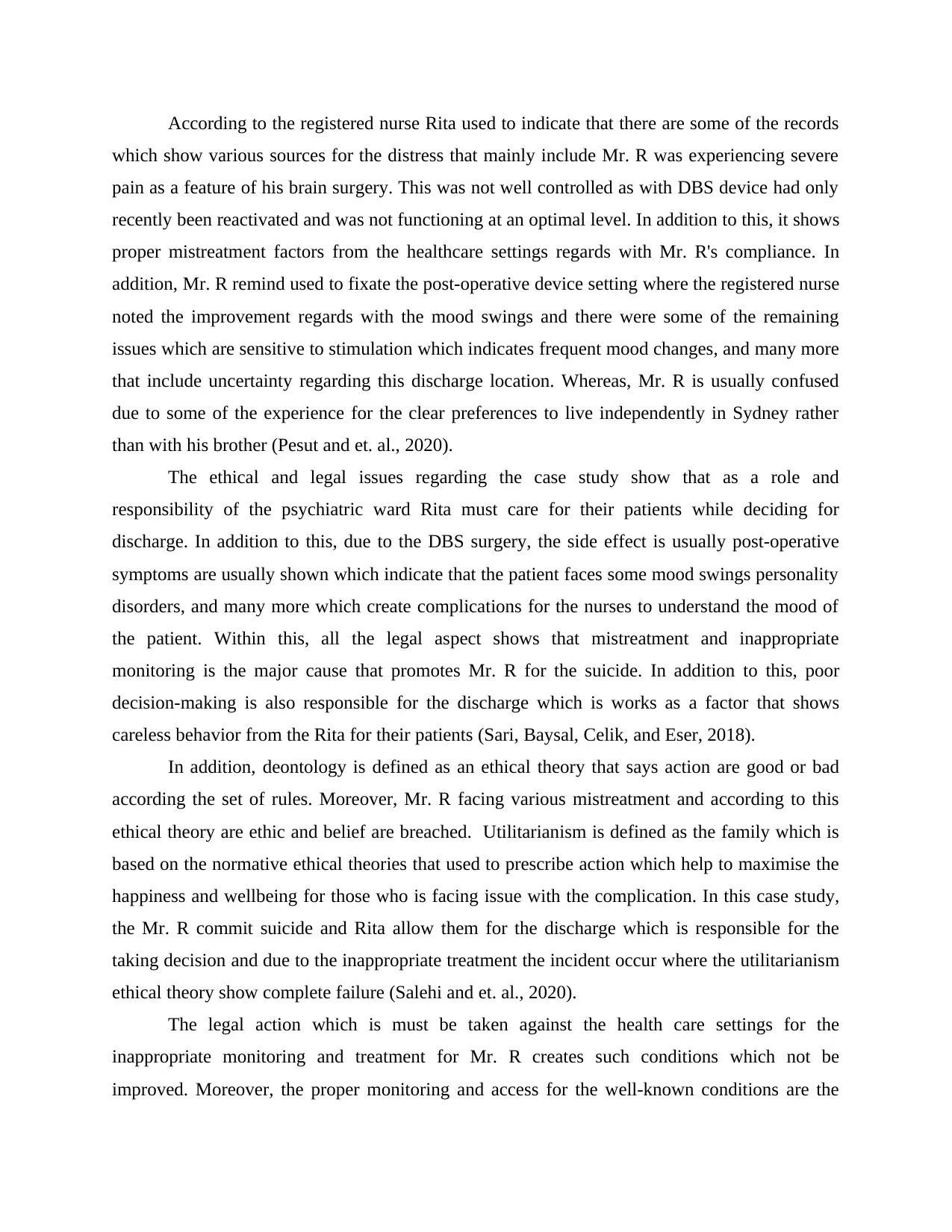
According to the registered nurse Rita used to indicate that there are some of the records
which show various sources for the distress that mainly include Mr. R was experiencing severe
pain as a feature of his brain surgery. This was not well controlled as with DBS device had only
recently been reactivated and was not functioning at an optimal level. In addition to this, it shows
proper mistreatment factors from the healthcare settings regards with Mr. R's compliance. In
addition, Mr. R remind used to fixate the post-operative device setting where the registered nurse
noted the improvement regards with the mood swings and there were some of the remaining
issues which are sensitive to stimulation which indicates frequent mood changes, and many more
that include uncertainty regarding this discharge location. Whereas, Mr. R is usually confused
due to some of the experience for the clear preferences to live independently in Sydney rather
than with his brother (Pesut and et. al., 2020).
The ethical and legal issues regarding the case study show that as a role and
responsibility of the psychiatric ward Rita must care for their patients while deciding for
discharge. In addition to this, due to the DBS surgery, the side effect is usually post-operative
symptoms are usually shown which indicate that the patient faces some mood swings personality
disorders, and many more which create complications for the nurses to understand the mood of
the patient. Within this, all the legal aspect shows that mistreatment and inappropriate
monitoring is the major cause that promotes Mr. R for the suicide. In addition to this, poor
decision-making is also responsible for the discharge which is works as a factor that shows
careless behavior from the Rita for their patients (Sari, Baysal, Celik, and Eser, 2018).
In addition, deontology is defined as an ethical theory that says action are good or bad
according the set of rules. Moreover, Mr. R facing various mistreatment and according to this
ethical theory are ethic and belief are breached. Utilitarianism is defined as the family which is
based on the normative ethical theories that used to prescribe action which help to maximise the
happiness and wellbeing for those who is facing issue with the complication. In this case study,
the Mr. R commit suicide and Rita allow them for the discharge which is responsible for the
taking decision and due to the inappropriate treatment the incident occur where the utilitarianism
ethical theory show complete failure (Salehi and et. al., 2020).
The legal action which is must be taken against the health care settings for the
inappropriate monitoring and treatment for Mr. R creates such conditions which not be
improved. Moreover, the proper monitoring and access for the well-known conditions are the
which show various sources for the distress that mainly include Mr. R was experiencing severe
pain as a feature of his brain surgery. This was not well controlled as with DBS device had only
recently been reactivated and was not functioning at an optimal level. In addition to this, it shows
proper mistreatment factors from the healthcare settings regards with Mr. R's compliance. In
addition, Mr. R remind used to fixate the post-operative device setting where the registered nurse
noted the improvement regards with the mood swings and there were some of the remaining
issues which are sensitive to stimulation which indicates frequent mood changes, and many more
that include uncertainty regarding this discharge location. Whereas, Mr. R is usually confused
due to some of the experience for the clear preferences to live independently in Sydney rather
than with his brother (Pesut and et. al., 2020).
The ethical and legal issues regarding the case study show that as a role and
responsibility of the psychiatric ward Rita must care for their patients while deciding for
discharge. In addition to this, due to the DBS surgery, the side effect is usually post-operative
symptoms are usually shown which indicate that the patient faces some mood swings personality
disorders, and many more which create complications for the nurses to understand the mood of
the patient. Within this, all the legal aspect shows that mistreatment and inappropriate
monitoring is the major cause that promotes Mr. R for the suicide. In addition to this, poor
decision-making is also responsible for the discharge which is works as a factor that shows
careless behavior from the Rita for their patients (Sari, Baysal, Celik, and Eser, 2018).
In addition, deontology is defined as an ethical theory that says action are good or bad
according the set of rules. Moreover, Mr. R facing various mistreatment and according to this
ethical theory are ethic and belief are breached. Utilitarianism is defined as the family which is
based on the normative ethical theories that used to prescribe action which help to maximise the
happiness and wellbeing for those who is facing issue with the complication. In this case study,
the Mr. R commit suicide and Rita allow them for the discharge which is responsible for the
taking decision and due to the inappropriate treatment the incident occur where the utilitarianism
ethical theory show complete failure (Salehi and et. al., 2020).
The legal action which is must be taken against the health care settings for the
inappropriate monitoring and treatment for Mr. R creates such conditions which not be
improved. Moreover, the proper monitoring and access for the well-known conditions are the
Paraphrase This Document
Need a fresh take? Get an instant paraphrase of this document with our AI Paraphraser
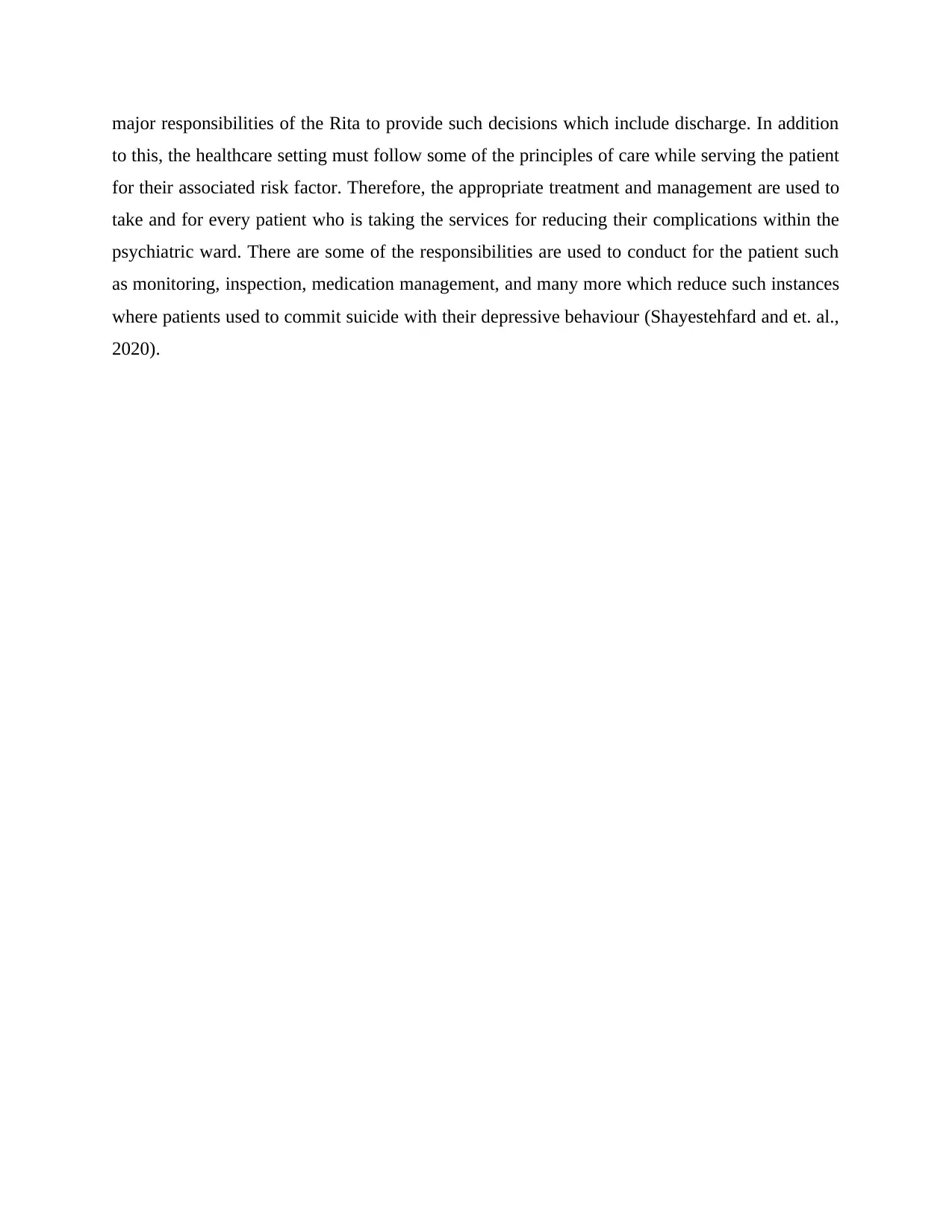
major responsibilities of the Rita to provide such decisions which include discharge. In addition
to this, the healthcare setting must follow some of the principles of care while serving the patient
for their associated risk factor. Therefore, the appropriate treatment and management are used to
take and for every patient who is taking the services for reducing their complications within the
psychiatric ward. There are some of the responsibilities are used to conduct for the patient such
as monitoring, inspection, medication management, and many more which reduce such instances
where patients used to commit suicide with their depressive behaviour (Shayestehfard and et. al.,
2020).
to this, the healthcare setting must follow some of the principles of care while serving the patient
for their associated risk factor. Therefore, the appropriate treatment and management are used to
take and for every patient who is taking the services for reducing their complications within the
psychiatric ward. There are some of the responsibilities are used to conduct for the patient such
as monitoring, inspection, medication management, and many more which reduce such instances
where patients used to commit suicide with their depressive behaviour (Shayestehfard and et. al.,
2020).
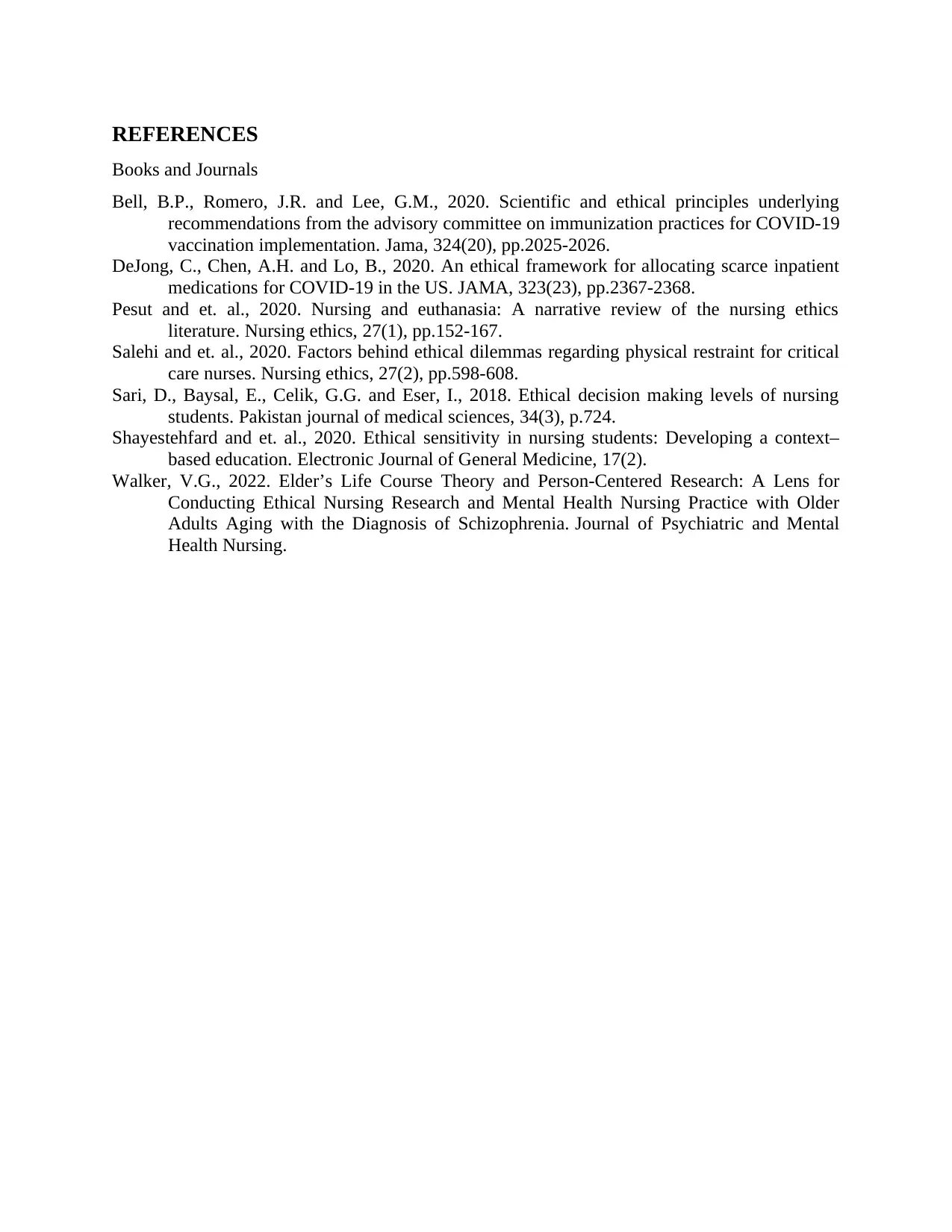
REFERENCES
Books and Journals
Bell, B.P., Romero, J.R. and Lee, G.M., 2020. Scientific and ethical principles underlying
recommendations from the advisory committee on immunization practices for COVID-19
vaccination implementation. Jama, 324(20), pp.2025-2026.
DeJong, C., Chen, A.H. and Lo, B., 2020. An ethical framework for allocating scarce inpatient
medications for COVID-19 in the US. JAMA, 323(23), pp.2367-2368.
Pesut and et. al., 2020. Nursing and euthanasia: A narrative review of the nursing ethics
literature. Nursing ethics, 27(1), pp.152-167.
Salehi and et. al., 2020. Factors behind ethical dilemmas regarding physical restraint for critical
care nurses. Nursing ethics, 27(2), pp.598-608.
Sari, D., Baysal, E., Celik, G.G. and Eser, I., 2018. Ethical decision making levels of nursing
students. Pakistan journal of medical sciences, 34(3), p.724.
Shayestehfard and et. al., 2020. Ethical sensitivity in nursing students: Developing a context–
based education. Electronic Journal of General Medicine, 17(2).
Walker, V.G., 2022. Elder’s Life Course Theory and Person‐Centered Research: A Lens for
Conducting Ethical Nursing Research and Mental Health Nursing Practice with Older
Adults Aging with the Diagnosis of Schizophrenia. Journal of Psychiatric and Mental
Health Nursing.
Books and Journals
Bell, B.P., Romero, J.R. and Lee, G.M., 2020. Scientific and ethical principles underlying
recommendations from the advisory committee on immunization practices for COVID-19
vaccination implementation. Jama, 324(20), pp.2025-2026.
DeJong, C., Chen, A.H. and Lo, B., 2020. An ethical framework for allocating scarce inpatient
medications for COVID-19 in the US. JAMA, 323(23), pp.2367-2368.
Pesut and et. al., 2020. Nursing and euthanasia: A narrative review of the nursing ethics
literature. Nursing ethics, 27(1), pp.152-167.
Salehi and et. al., 2020. Factors behind ethical dilemmas regarding physical restraint for critical
care nurses. Nursing ethics, 27(2), pp.598-608.
Sari, D., Baysal, E., Celik, G.G. and Eser, I., 2018. Ethical decision making levels of nursing
students. Pakistan journal of medical sciences, 34(3), p.724.
Shayestehfard and et. al., 2020. Ethical sensitivity in nursing students: Developing a context–
based education. Electronic Journal of General Medicine, 17(2).
Walker, V.G., 2022. Elder’s Life Course Theory and Person‐Centered Research: A Lens for
Conducting Ethical Nursing Research and Mental Health Nursing Practice with Older
Adults Aging with the Diagnosis of Schizophrenia. Journal of Psychiatric and Mental
Health Nursing.
⊘ This is a preview!⊘
Do you want full access?
Subscribe today to unlock all pages.

Trusted by 1+ million students worldwide
1 out of 6
Related Documents
Your All-in-One AI-Powered Toolkit for Academic Success.
+13062052269
info@desklib.com
Available 24*7 on WhatsApp / Email
![[object Object]](/_next/static/media/star-bottom.7253800d.svg)
Unlock your academic potential
Copyright © 2020–2026 A2Z Services. All Rights Reserved. Developed and managed by ZUCOL.





